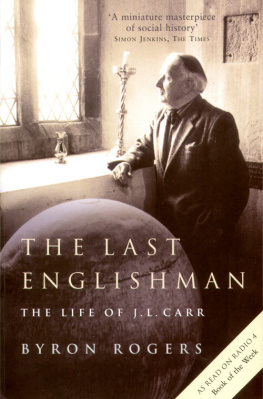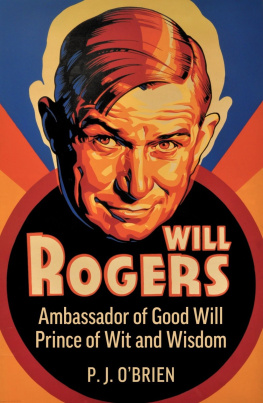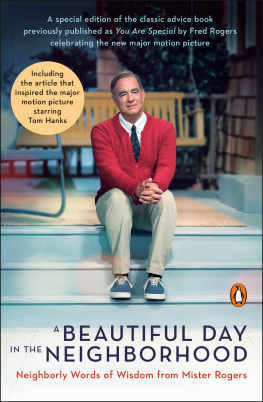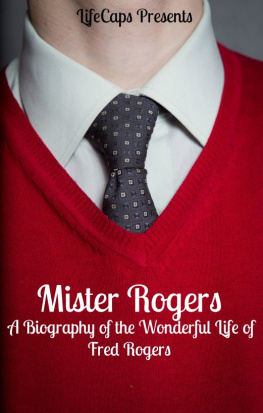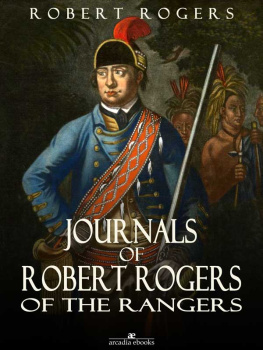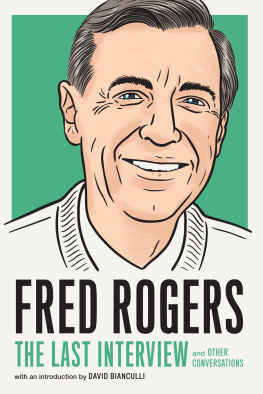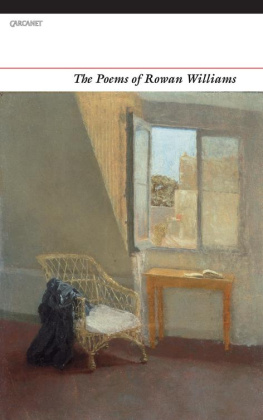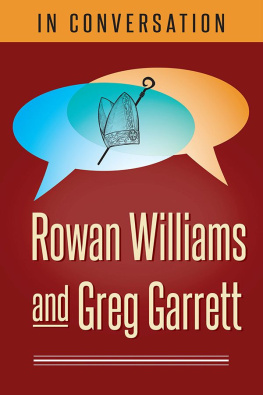

B YRON R OGERS is the author of The Last Englishman: The Life of J.L. Carr (A miniature masterpiece of social history Simon Jenkins in The Times); The Bank Manager and the Holy Grail: Travels on the Wilder Side of Wales (Completely mad and very charming Jeremy Paxman, Observer Books of the Year); An Audience with an Elephant and Other Encounters on the Eccentric Side (Possibly the funniest, most charming and beautifully written book Ive read in years Western Mail); The Green Lane to Nowhere: The Life of an English Village and The Last Human Cannonball and Other Small Journeys in Search of Great Men. All have been published by Aurum. The Gregynog Press publish The Lost Children. He lives in Carmarthen and Northamptonshire.
A strikingly vivid and tender reading of the man... The main virtue of Rogers excellent biography is that it traces the capillaries of fine wit that ran behind the austere faade of its subject
Observer
You wouldnt necessarily set a humorist on the tail of a thrawn old Welsh clergyman poet and expect a biography of much merit, but it is precisely Byron Rogers darkly comic sense of the ridiculous that melts the frost from the head of R.S. Thomas and humanises a remote and bleakly beautiful writer. The austerity and extremism of Thomass life and work, his profound contradictions and concentrated theocentrism, are tackled with sensitivity and a sprightly wit
The Times
A chatty, disorderly but extremely good [biography]... A wonderfully comprehensive picture of the man
Daily Telegraph
As revealing an account of a severely private individual as anyone could hope to achieve... Rogers discovers a drily witty man who had a sociable side if only you could find it, and many who knew him well would agree
Alan Brownjohn, Times Literary Supplement
Engagingly high-spirited and daring. The single most striking effect is to turn a career characterised by sternness into a catalogue of black comedies
Andrew Motion, Guardian Book of the Week
Charming and deftly written... Rogers is frank but not intrusive. His tone is quiet, intimate and reflective... [He] seems to have no axe to grind, and his unspectacular manner allows him to probe the poets pretty strange life without sensationalism... A telling portrait is achieved by narrating the story of Thomass life through a patchwork of quotations, letters, diaries, interviews and extended personal testimonies, most of them from what contemporary politicians call ordinary people... Here we have gossip of a pleasing kind, small-scale but not petty, revealing but not prurient. One side effect of letting his sources speak for themselves is that Rogers has produced a very funny book
Literary Review
As readable and rounded a life of the man as could be written
Tablet
Byron Rogers brilliant, often hilarious biography deserves literary gongs galore... Rogers very human portrait of a great poet is a wonderful introduction to a genuine character who... was shot through with that gleaming streak of genius that makes him irresistibly fascinating
Saga
After tracking down the Holy Grail in a bank vault in Aberystwyth, it is hard to know what to do for an encore. But Byron Rogers has found the perfect elusive quarry in the poet R.S. Thomas... The Man Who Went into the West is unlike any other biography, which is as it should be
Ferdinand Mount, Spectator Books of the Year





First published in 2006
by Aurum Press Ltd, 7 Greenland Street, London NW1 0ND
This eBook edition first published in 2012
All rights reserved
Byron Rogers, 2006
The right of Byron Rogers to be identified as author of this work has been asserted in accordance with Section 77 of the Copyright, Designs and Patents Act 1988
This eBook is copyright material and must not be copied, reproduced, transferred, distributed, leased, licensed or publicly performed or used in any way except as specifically permitted in writing by the publishers, as allowed under the terms and conditions under which it was purchased or as strictly permitted by applicable copyright law. Any unauthorised distribution or use of this text may be a direct infringement of the authors and publishers rights, and those responsible may be liable in law accordingly
E-book conversion by CPI Group
ISBN 978-1-84513-757-1

R.S. Thomas drawn by his wife Elsi, 1939. The beard is the one his mother made him remove the moment the two turned up in Holyhead.



I wish to acknowledge my gratitude: to the Welsh Books Council for its financial contribution towards research which involved me crossing and recrossing Wales like an early Christian saint; to Kunjana Thomas for quotations from all poems 19451990; to Bloodaxe Books for quotations from Collected Later Poems19882000 (Bloodaxe, 2004); to J.M. Dent, a division of the Orion Publishing Group, for quotations from Autobiographies, translated by Jason Walford Davies (J.M. Dent, 1997); to Dr Raymond Garlick for letting me read and quote from the letters sent him by R.S. Thomas.
On a more personal level, to those without whose help this book could not have been written: to the Rev. Donald Allchin; to John Barnie of Planet; to George Behrend; to Dr Tony Brown of the R.S. Thomas Study Centre at Bangor; to Marie Carter, Health Sciences Librarian at the Robert Jones and Agnes Hunt Orthopaedic and General Hospital, Oswestry; to Ray Carter CBE, for, yet again, his book collection; to Penny Condry; to the Rev. Evelyn Davies; to Jenny Dyer; to Lord Dynevor; to Imogen Elliott and Genia Conroy, the daughters of General Pugh; to Christine Evans; to Jon Gower; to Liam Hanley; to John Harris; to Dr Glyn Tegai Hughes; to Cassie Jones; to Peter Joliffe; to Prof. Bobi Jones; to Gwyneth Lewis; to Sharon Lunney; to Dr John Marchant and his daughters Jan Spalding and Gillian Arney; to Ann Moorey; to John and Peggy Mowat; to Twm Morys; to Gareth Parry; to Alan Powers; to the Rev. Bill Pritchard; to Anne Price-Owen of the David Jones Society; to Dr John Rowlands; to Denise Rylands; to Robin Simon; to Prof. Meic Stephens; to Jonathan Stedall; to Angharad Tomos; to Rhodri and Betty Thomas; to Professor Meurig Wynn Thomas; to Gareth Williams; and to the people of Manafon, Eglwys Fach, and Aberdaron who talked to me. And to Graham Coster at Aurum, who had the nerve to commission the book.
Lastly, to someone without whom it would not have been written: to Andreas Gwydion Thomas.

Next page


